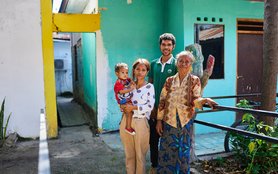Oxfam joins world leaders, civil society and people around the world to celebrate the adoption of the Sustainable Development Goals by world leaders at the United Nations, but cautions that progress toward them must be tangible, political and disruptive. The goals were painstakingly negotiated with input from civil society, academics, scientists and the private sector, and millions of citizens around the world and seek to eradicate extreme poverty, fight inequality and injustice, and fix climate change over the next 15 years.
“The new Sustainable Development Goals are ambitious on paper – and they could be historic in their impact. They seek to go beyond band-aid solutions by setting out to eradicate – not just reduce – extreme poverty and hunger in every country,” said Winnie Byanyima, Executive Director of Oxfam International. “The key is to welcome the richest people back in touch with the rest of society, rather than allowing them to exist on the margins of privilege.”
Oxfam praised the new focus of “leaving no one behind”, but warned this requires the participation of the most vulnerable and marginalized people so they can hold their governments to account and claim their rights. Women must be central to realizing these goals, while at the same time the concentrated power of vested interests must be challenged and those interests held more accountable by governments and citizens.
“With 17 goals and 169 targets, this promise is a necessarily complicated one,” continued Byanyima. "To leave no one behind, we have to understand the many barriers people face, from economic and gender inequality to how the most vulnerable are the most affected by climate change. The goals are achievable, but it cannot be business as usual. Governments – rich and poor – must defy vested interests that seek to maintain the status quo at the expense of people and the planet.”
To meet this shift of power, Oxfam says national and international financing rules must be rewritten, including a clamp down on tax avoidance by multinational companies, and measures by governments to ensure the richest contribute more equally to the rest of society. Additionally, an agreement at the Paris climate talks that delivers for the poorest must be made if “zero hunger” is to ever be achieved.
"We can indeed be the first generation to eradicate extreme poverty and hunger, but we are the last generation that can avert catastrophic climate change. We are all responsible for making this happen,” said Byanyima. “Our political leaders have set the goals. There is a collective responsibility now to achieve them.”


